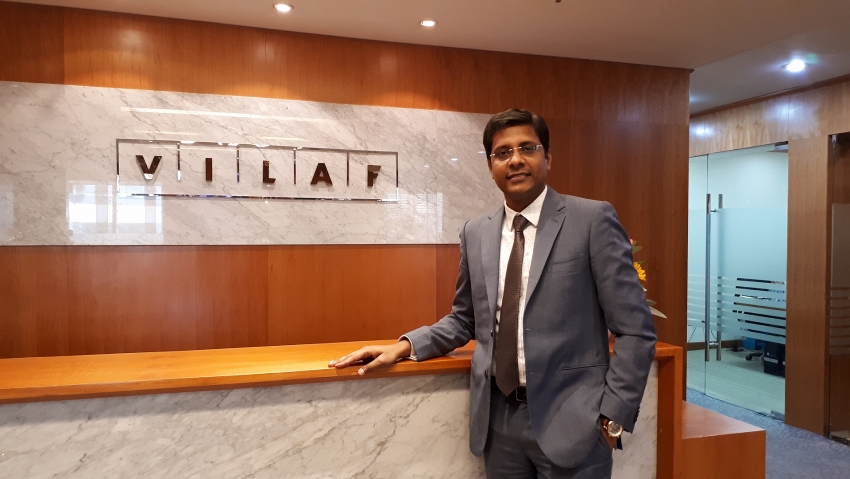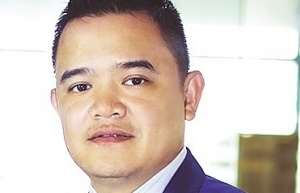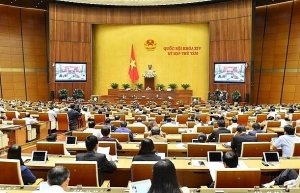Vaibhav Saxena: Legal improvements increase investment attraction
 |
| Vaibhav Saxena |
As a famous foreign lawyer in Vietnam, which sectors do you specialise in?
I have been working in Vietnam as a lawyer for around five years. My major practice areas are power and energy, pharmaceuticals, and infrastructure. Apart from that, as lawyers, we do regular corporate M&A, as well as JV and cross-border transactional advisory to encourage business and especially investment in Vietnam with a growth entrustment for the private sector. I also do some part of policy advisory works to provide assistance to the Vietnamese government in formulating a robust legal framework by outperforming private industry expectations while at the same time securing Vietnam’s interests.
I am working at Vietnam International Law Firm (Vilaf), which is among the best law firms in Vietnam, where I work with clients’ worldwide. Power and energy, pharmaceuticals, and aviation are now among the most appealing sectors to international investors with recent legal changes, opening wide opportunities for them to venture further into the country.
What do you think about Vietnam’s changes of the laws on the energy sector and overall investment regulations in the recent five years? Are they enough to increase the appeal of the sector?
Vietnam has done quite well in the past decade. The legal framework on the energy sector is quite streamlined if we speak about conventional power sources that come under the BOT regime, but in the future, there will be some challenges because of limited government guarantees, including FX convertibility security limitations that the government is considering.
The solar sector has been very hot in the past two and a half years and even now the investment is geared to flow once the solar decision is officially promulgated by the prime minister. As we all witnessed, Vietnam has made a mark in the history of Asia by reaching the generation capacity of 4.9GW of solar power in a mere span of two years. It shows the interest from investors and that Vietnam is a secure destination to grow your investments. In the future, the policies will be slightly different and it is expected that an auction market will be put into place in order to make it more competitive.
Though some investors may prefer a higher feed-in tariff (FiT) option and the ones who can compete with low prices will raise their hands for an auction system, from my practical experience from other countries, I think that Vietnam is not performing anything out of the blue, but we have seen similar trends in all major power markets in the world that started with an attractive FiT to encourage investment and build up renewable energy generation capacity and later as the market develops, the auction system enters as a game-changer.
I think that it is a smart move as it makes the market more competitive and it will lower electricity costs for end-users and lighten the burden on Electricity of Vietnam (EVN). Vietnam is also exploring solar park development where investors will be allocated certain areas to install solar projects and another option can be allowing the private sector to set up solar parks and support land allocation by the government. However, these are considerations only for now and will take some time to shape up as a policy once approved by the authorities.
On the other hand, we have a Direct PPA mechanism scheduled to be launched at a pilot stage in the next year, especially to support solar rooftop power generation capacity which is again a positive sign for private players to explore opportunities and even for state agencies to lower their power supply burden and focus on grid upgrades. Vietnam is working extensively on enhancing national and provincial grid capacity and in the coming two years we will see a new milestone achieved by Vietnam in terms of fast-paced grid enhancement.
The definitions of developed nation or policies are wide open and debatable depending on perception. Every economy in the world is developing at their own pace and development has no limits, we learn new things with the passage of time. The same applies to Vietnam and as the market develops, there will be more opportunities for all to explore. It is never enough to ascertain whether what has been done will be sufficient or not.
You have travelled a lot to work with your clients around the world and have experience working at international agencies, government bodies, and the private sector. What are the differences between Vietnam and regional countries in terms of market potential and legal framework?
From my experience, it is not possible to compare different countries completely, the reason being that they are distinct in terms of constitutional and organisational structure, people's mindset and lifestyle, or we can say supply and demand requirements. Vietnam has huge market potential including key areas like transport system, education sector, power sector, pharmaceutical sector, logistics including port development, and many more areas, all having a fantastic bandwidth to accommodate plentiful investment and development opportunities in Vietnam.
The country has a lot of areas where it can come up with encouraging policies and call on the private sector from around the world to invest in Vietnam and develop the country with their business gains. Supply and demand chains with streamlined policies are what investors expect from any country and Vietnam is surely working constantly and efficiently on it. We saw recently that the Ministry of Planning and Investment (MPI) and Vietnam celebrated 30 years of investment in Vietnam which is another landmark for the country.
If we look at the ASEAN region now, Vietnam is among the biggest players in terms of investment and the GDP growth rate is constantly increasing. The legal framework matures as the market grows and the same has happened with all countries in the past. For example, when there was no light bulb or power source, the world used candles during the night hours and there were different means of mobilising machinery based on fire, coal, or wooden tools – but when power sources were invented, the market developed in that area.
Development in any country takes several years and it is not a quick process because human life is just a few fleeting moments for a nation that exists for centuries. Vietnam has been doing the best it can in terms of legalities and adjusting already existing laws. We, as lawyers, do acknowledge the efforts of the country and provide ample support to the nation. It will also benefit the private sector at large when markets of different countries are developed at a streamlined pace.
Having worked for long in Vietnam with involvements in several organisations, how have you contributed to supporting FDI inflows to Vietnam and to enhancing Vietnamese-Indian ties?
It has been a wonderful journey with Vietnam, though as a foreign lawyer it was quite challenging to come to grips with the framework and regulations of this country, but it seems like my efforts were not in vain.
I experienced the complexities of the continued refinement of the Vietnamese legal system, which has made it more difficult for foreign lawyers, unlike 10 or 20 years ago when foreign lawyers had the upper hand with foreign law degrees and English skills. Now the legal industry is far more competitive, with refined local lawyers who stand on par with international legal standards.
I came to Vietnam around half a decade ago to experience an emerging market in the ASEAN and then enormous efforts were made to absorb and adapt to the country. I have been supporting the legal industry for long now, including refining the abilities of young lawyers and students at the universities who will lead tomorrow.
Apart from being a lawyer, I also took up with the Indian Business Chamber in Vietnam (InCham) where I served my home country and Vietnam for years in different roles, one of which was general secretary. We have seen that the two countries have made significant achievements in the past years, and we are striving for more as our leaders have planned. I plan to do more in my new role as the vice chairman of InCham to contribute to further strengthening the bilateral ties between Vietnam and India.
Also, I have been involved with the American Chamber of Commerce in Vietnam (AmCham) and provide support to the AmCham legal committee which is sharing the journey with all of us to make Vietnam a better place from a policy perspective in the years to come. Apart from that, I am actively involved with Vietnam Business Forum (VBF) working groups that again provide policy support to the government of Vietnam.
There have been different platforms in Vietnam and other countries, including various organisations that I have been associated with and joined them in making a change towards a bright vision.
All experiences in life teach us something, and being able to identify positivity in different circumstances determines the future. Learning is a continuous process and I will keep learning in the remaining years of my journey and hope that our collective efforts will make this world an even better place to live.
 | SOE concept a focus of law discussion Varying comments continue to hit the draft amendments to the Law on Enterprises 2014 and the Law on Investment 2014, with further revisions cited for ... |
 | An enterprise law fit for the next 20 years The Law on Enterprises is seeking to open up business prospects for companies wishing to get involved in Vietnam’s future growth, ironing out limitations along ... |
 | National Assembly deputies give voice as law on PPP takes shape After months of revisions and expectation, the National Assembly has officially voiced support for the revenue risk sharing mechanism in the long-awaited draft Law on ... |
What the stars mean:
★ Poor ★ ★ Promising ★★★ Good ★★★★ Very good ★★★★★ Exceptional
Related Contents
Latest News
More News
- Vietnam-South Africa strategic partnership boosts business links (February 06, 2026 | 13:28)
- Mondelez Kinh Do renews the spirit of togetherness (February 06, 2026 | 09:35)
- Seafood exports rise in January (February 05, 2026 | 17:31)
- Accelerating digitalisation of air traffic services in Vietnam (February 05, 2026 | 17:30)
- Ekko raises $4.2 million to improve employee retention and financial wellbeing (February 05, 2026 | 17:28)
- Dassault Systèmes and Nvidia to build platform powering virtual twins (February 04, 2026 | 08:00)
- The PAN Group acquires $56 million in after-tax profit in 2025 (February 03, 2026 | 13:06)
- Young entrepreneurs community to accelerate admin reform (February 03, 2026 | 13:04)
- Spring Fair 2026 launches national fair series (January 30, 2026 | 16:17)
- SnP celebrates 10th anniversary with new brand identity (January 30, 2026 | 14:41)

 Tag:
Tag:



















 Mobile Version
Mobile Version